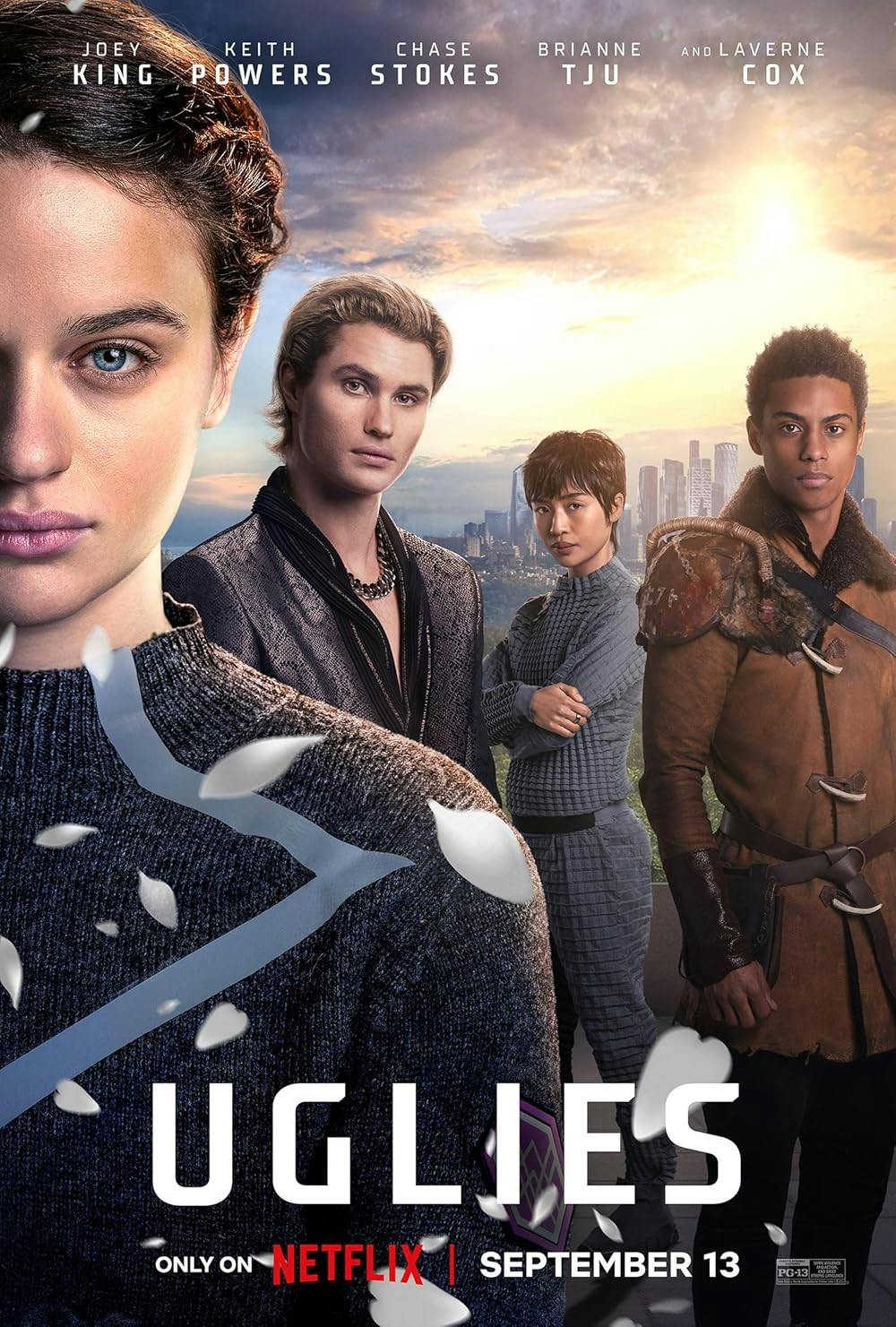As longtime connoisseurs of teen-dystopia dramas, we approached “Uglies” with little expectation for complexity and insightful social commentary, but instead hope for something entertainingly bad. “Uglies,” however, feels like a 102-minute trailer that touches on interesting ideas but never delves beyond surface-level. For a movie arguing that the most important thing is someone’s character and inner worth, it severely lacks either.
The film is a long-awaited adaptation of Scott Westerfeld’s titular book series. According to readers, the movie is generally faithful to the plot, but it reduces the book's complexity to fit an underestimated audience intelligence.
Director McG, best known for “Charlie’s Angels” and “The Babysitter,” steps away from his typical high-camp style to create the world of “Uglies.” Although many fans of Westerfeld’s original novel were excited to see the novel finally come to the screen, they had little information about it beyond basic information about the cast and a brief trailer. Despite this, “Uglies” debuted in second place on the Netflix charts, gaining 20 million views within three days of release.
Like the novel, the movie centers around Tally Youngblood (Joey King), who lives in a post-apocalyptic world where, at the age of 16, everyone receives heavy plastic surgery as part of “The Transformation,” making them a physically perfect “Pretty.” Just before Tally is set to undergo The Transformation, she befriends the rebellious Shay (Brianne Tju), who introduces Tally to the idea of avoiding the surgery altogether; instead, Shay joins The Smoke, a revolutionary organization inexplicably led by the 18-year-old David (Keith Powers). As Tally learns more and more about the evil underbelly of her world, she is forced to choose between her new friendships within The Smoke and her best friend, now-Pretty Peris (Chase Stokes).
The pacing and scene organization left much for the audience to desire. For a shorter movie, it dragged uncomfortably. Serious scenes would be halted by silly interjections without smooth transitions. There were moments when the pace seemed to hit a rhythm, only to be confusingly sped up in an effort to cram in plot points. As the credits roll, the audience leaves with a fairly forgettable mess that ends on a cliffhanger, anticipating a sequel no one wants.
The pacing is not helped by the film’s strange visuals and music choice. The CGI of “Uglies” is admittedly not great — many of the scenes where characters ride hovering skateboards are somewhat nauseating — but overall it does a serviceable job showcasing the divided world. The film has several redeeming moments of lovely cinematography, such as when fields of white, energy-producing orchids are burned.
The main visual problem lies with the Pretties, who are supposed to be uncannily perfect but look too akin to regular attractive people for their appearance to have any meaning. For the main characters, they throw on a skin-smoothing filter and some colored contacts; the rest of the Pretties are just regular hot people, indistinguishable from the objectively attractive main cast.
This was an intentional choice by director McG to convey how even conventionally attractive people are harmed by beauty standards. However, his point is completely undermined by the similarity between the main cast of Uglies and the background Pretties.
As soon as the audience begins to get invested in Tally’s world, an ill-fitting pop song would blare over the soundtrack, almost drowning out any dialogue. Songs with titles like “Be Yourself” play as Tally and Shay inexplicably skip their dystopian brainwashing classes to skateboard, which is very on the surgically-altered nose.
The combined effect of these is hard to describe; as disconcerting visuals fly past the audience and strange synthetic songs blare, any sense of what’s going on, who the characters are or why we should care is lost.
The plot and time spent on character relationships, or lack thereof, similarly detaches the audience from the supposed stakes of the movie. Tally and Peris only share three scenes before he becomes a Pretty, one a flashback and another an emotionally vacant farewell. For a relationship that is supposedly foundational to Tally’s psychology, there is little time spent on its development.
This treatment extends to every other relationship in the movie. Repurposing unnecessary scenes and adding 10 minutes to develop character dynamics would have given the plot more weight and flow.
Despite having a star studded cast of Joey King, Chase Stokes, Keith Powers and Laverne Cox, the writing makes little use of their talent. Any and all credit goes to the actors for creating somewhat convincing characters. King specifically carried Tally’s development well and found room for subtlety even with obvious dialogue. However, it was not enough to make up for the movie’s general lackluster energy.
It seemed that Netflix was interested in creating any YA dystopian film, perhaps attempting to mirror the success of the recent “Hunger Games” adaptation, “The Ballad of Songbirds and Snakes”. Westerfeld’s novel was its unfortunate victim.
“Uglies” is okay at best and emblematic of depressingly profit-minded movies at worst. The job of a good movie is to either say something new or something known in an interesting way. “Uglies” does neither. We recommend skipping this one.
Get The Chronicle straight to your inbox
Sign up for our weekly newsletter. Cancel at any time.

